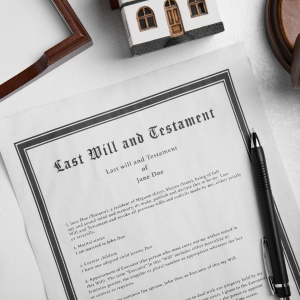
You might be wondering if it’s possible to sell your newly inherited home in Alexandria, VA. As you may know, Virginia has its own rules and laws that make it hard to figure out how to handle property that you’ve received. This guide is meant to help you learn important things about selling your Alexandria home. It will primarily focus on the law and what heirs can do to speed up the process. This guide is full of valuable information to help you make the most informed decisions possible. 4 Brothers Buy Houses can help ensure a smooth sale process, whether you are selling a family home or a group of assets.
Key Highlights
- Virginia’s property law and probate are crucial for selling inherited estates effectively and in accordance with the law.
- Intestate succession outlines the distribution of assets when a will is absent, prioritizing the family hierarchy.
- Virginia probate requires unanimous consent from heirs for property sales, which impacts the transaction process.
- Tax obligations, such as capital gains, impact financial outcomes when selling inherited property.
- Managing multiple heirs requires strategic planning to ensure all parties agree on the sale of the property.
Understanding Inherited Property Laws in Virginia
Virginia’s rules regarding inherited property are pretty complex. They cover probate, estate planning, and intestate succession all in great detail. By understanding the key aspects of Virginia’s property law, we can see how they impact the management and distribution of family property. Understanding the complicated area of intestate succession is also an important part of inheriting in this case. This is what happens when a property owner dies without leaving a will. By learning more about these rules, heirs can better manage the property they’ve inherited and avoid any legal problems that may come up during the transfer or sale.
Key Aspects of Virginia’s Property Law

The most important thing to know about the Virginia land that you inherited is the laws related to it. It tells you how to run and pass on property. Getting a divorce and managing an estate are two important tasks that require careful attention. Be aware of these laws so you can protect your rights and maintain the estate’s value during the transfer process.
One thing that makes it different is how it handles assets. It may be difficult to understand, but probate ensures that a will is legally valid and that it’s clear to change who owns property. If the heirs understand how things work in Virginia, they can quickly settle the estate while still honoring the deceased’s wishes.
Additionally, making a will is crucial because it allows individuals to designate who will inherit their belongings after they pass away. Avoid disputes over your will, power of attorney, or trust. Ensure that everyone understands what was intended. Virginia’s property law provides a formal means for individuals to resolve their disputes. For land sales to be fair, legal, and run smoothly, people across the state need to be aware of these formal steps.
The Role of Intestate Succession in Inheritance
This is how Virginia’s assets are divided when someone dies without a will. It’s a big part of the state’s property laws. Giving partners and children the most weight is usually the first one on the list. This ensures that estates are divided fairly in accordance with family ties and relationships. When there is no will, this set of rules provides structure for dividing the estate. This gives direction and reduces uncertainty.
Virginia’s intestate succession order is crucial for heirs who wish to understand their property rights. If there are no direct heirs, the law allows relatives farther away to step in. When kids understand these rules, they don’t fight and ensure that every child gets their fair share. Virginia law provides individuals with options to resolve disputes privately and prioritize the best interests of the children when disagreements arise.
Succession without a will affects more than just wills. It also affects real estate deals. When someone dies without leaving a will, their property is distributed according to the laws of intestacy. To sell the house, all owners must agree and comply with the rules set by the state. To ensure ownership rights and a valid, smooth sale, you may need to consult a lawyer. After all is said and done, Virginia’s intestate succession rules are fair because they help heirs legally and safely handle, divide, or sell the property they received.
Legal Aspects of Selling Inherited Property in Virginia
Navigating the sale of inherited property in Virginia requires a thorough understanding of the legal aspects. Heirs must prepare themselves with the essential documents and comprehend Virginia-specific legal considerations to facilitate a smooth transaction. These elements are crucial for ensuring compliance with property law and effectively managing estate administration. Delving into these aspects will enable heirs to approach the sale process with confidence and clarity, minimizing potential legal complications that could arise during probate or the transition of ownership.
Documents Required for Selling Inherited Property

If you live in Virginia and want to sell your home for cash in Alexandria, VA, it is essential to carefully plan the deal and ensure you have all the necessary forms. The will is the most important document because it names the beneficiaries and specifies how the estate’s assets should be divided. After the court signs off on the will, it is up to the agent, if one is named, to sell the land. Documentation may be necessary to establish who actually owns the house and to help the sale if there is no will in place. You will also need proof of the person’s death to initiate the inheritance process.
After the will has been proven, the court issues letters of administration or testamentary to the assistant or administrator. That person can sell the house and take care of it with this letter. You will be responsible for ensuring that buyers receive the correct title if you have an up-to-date property contract in place. People who own a house should review their tax returns and mortgage papers to ensure there are no outstanding debts or liens on it before listing it for sale.
In the last sentence, the deal is broken down into words of money and the law. Ultimately, the deal is made public. It will be faster to sell, there will be less time spent in court, and the heirs will be protected during the transfer of ownership if they understand and get the important paperwork.
Financial Implications of Selling Inherited Property
Before they sell their land in Alexandria, VA, the owners need to understand a few key financial considerations. You need to determine your taxes and explore potential benefits for which you may be eligible. This has big financial effects. It’s not enough to simply change who owns something; you also have to contend with Virginia’s complex property laws, as well as potential probate issues. Heirs can ensure they get the most out of their inheritance and avoid unexpected financial problems by paying attention to these key considerations. The selling process will proceed more quickly if the heirs take these steps. They can also ensure that the estate administration helps them achieve their financial goals.
Tax Obligations and Potential Benefits
There are several financial factors to think about when you sell the Virginia home you inherited. The value of the estate can decrease due to taxes, which is significant. Virginia does not have an estate tax, but some states do. The heirs may still be required to pay federal estate taxes if the estate exceeds the federal estate tax thresholds. If you plan your estate early, you can retain a greater portion of the gift’s value and pay less in taxes.
There is a different way to calculate capital gains tax when you sell land that you received as a gift. This is one of the most important things to keep in mind. The IRS uses a method called “stepped-up basis” to change the property’s value to what it would have been worth on the market at the time of death. That is, heirs are only charged when the property’s value increases after they inherit it, not when it’s still owned. Having a professional evaluate it can help you determine its market value. If you do this, you may be eligible to pay less tax on your income.
To complete these tax tasks effectively, you need to plan and consider seeking professional help. After the death of a loved one, the heirs can receive the most money, spend it wisely, and ensure that the sale aligns with their long-term plans for managing their wealth. By addressing these small but important financial matters, owners can be confident that their transactions are legal, generate income, and increase the value of their home when they sell it.
Challenges to Selling Inherited Property in Alexandria
There are strict rules regarding property and estates in Virginia, which can make it challenging to inherit property in the city of Alexandria. The family has more trouble with these things when there are more sellers, which usually makes it harder to sell. Heirs need to understand these complex issues so they can effectively navigate the legal and business challenges they face. When there are problems with shared ownership, ensuring that probate rules are followed and addressing property law issues are some of the most important considerations. There are several key rules to be aware of if you want to sell your house fast for cash in Woodbridge, VA. You can receive them without any issues.
Addressing Multiple Owner Situations

Some family homes in Alexandria, Virginia, are hard to sell when more than one person owns them. A type of property that is inherited by more than one family is called “heirs’ property,” and everyone who owns a share in it must agree to the sale before it can occur. If everyone doesn’t agree, arguments may arise. This could lead to expensive court cases, such as division suits, where the court orders the property to be sold or divided. These arguments can slow down the sale, reduce the house’s value, and increase the cost of lawyer fees.
To ensure everything goes smoothly, the heirs must provide clear proof of ownership of the property. These can include probate documents, such as the will and letters of administration, from Virginia’s estate court. An executor or manager is crucial for ensuring that heirs receive their rightful inheritance and that the estate is distributed according to the deceased person’s wishes. Instead of going to court when people disagree, mediation or estate planning discussions can help bring their different needs together.
What’s worse is when family members have different ideas about money, like whether to sell quickly or hold on to make money in the long run. Virginia’s property law offers solutions, such as buyout agreements that facilitate the transfer of land ownership by allowing one heir to purchase another’s share. If the heirs receive sound legal advice and a well-planned approach, they can effectively manage these issues, reach a mutually beneficial agreement, and complete the sale efficiently. If you know and follow Virginia’s rules, you can stay out of trouble, avoid arguments, and get the most money when you sell property you bought together.
Do All Heirs Have to Agree to Sell Property?
Virginia law states that anyone who inherits land upon a death must agree before it can be sold. Things might take longer and not go through as often if there is conflict. By following this rule, the business will not sell anything without obtaining permission from all parties involved. When someone dies and leaves property to other people, that property is referred to as “heir’s property,” and everyone has the same legal right to it. Of course, everyone involved must agree to the sale for it to proceed. If someone tries to steal something or go to court, it could slow things down.
The land belongs to the whole family, so everyone has an equal say in how it is used or sold. Even if you plan your estate well and solve problems before they happen, there may still be disagreements. This is the ideal time for mediation to be effective. It maintains peace within the family and allows the heirs to resolve their issues without resorting to court. Virginia law promotes peaceful methods for resolving disputes, enabling heirs to make decisions efficiently and cost-effectively.
Individuals who own land can petition the court to divide it if they are unable to reach a mutually agreeable settlement. A judge will decide whether to sell the land or divide it up. This way breaks deadlocks, but the property is usually worth less, and the settlement process takes longer. If the heirs understand that they need to agree on everything and are proactive about planning their estate and communicating with each other, they can effectively manage the property they received together. This is legal and good for business.
Ready to sell your home fast and skip the hassle of costly repairs? 4 Brothers Buy Houses offers fair cash offers and a smooth, worry-free selling experience. Contact us today at 202-601-4928 .
FAQs:
Can I sell inherited property in Alexandria, VA?
Yes, you can sell inherited property in Alexandria, VA. However, it is crucial to understand Virginia’s specific inheritance laws and procedures, which may include probate and estate planning processes that must be addressed before a sale can be finalized.
What is intestate succession, and how does it affect selling inherited property in Virginia?
Intestate succession refers to the legal process by which an estate is distributed when a person dies without a will. In Virginia, this affects how property is divided among heirs and may impact the sale process, especially if ownership stakes are not clearly defined or if multiple heirs are involved.
What documents are necessary for selling inherited property?
The key documents required include the will (if available), death certificate, letters of administration or testamentary, property deed, outstanding mortgage documents, and tax statements. These ensure legal compliance and smooth processing of the sale.
Do all heirs need to agree to sell the inherited property in Virginia?
Yes, all heirs must agree to sell the inherited property. Virginia law requires unanimous consent among heirs for the sale to proceed, safeguarding each heir’s interests and legal rights in the property.
What tax implications should I consider when selling inherited property in Virginia?
Key tax considerations include potential federal estate taxes and capital gains taxes, with the latter calculated using a stepped-up basis to fair market value at the time of the original owner’s death. Understanding these can help minimize tax liabilities and maximize the property’s value.
Helpful Alexandria Blog Articles
- How Much is Home Staging Cost in Alexandria, VA
- Can I Sell My House If I’m Behind on Payments in Alexandria, VA?
- How Long After an Appraisal Can You Close in Alexandria, VA?
- How To Attract Buyers For Distressed Property in Alexandria, VA
- How Much Does A Divorce Home Appraisal Usually Cost in Alexandria, VA
- Common Mistakes When Selling A Fire-Damaged House in Alexandria, VA
- Can Heir Property Be Sold in Alexandria, VA?
- Selling a House with Solar Panels in Alexandria, VA
- Do You Need a Deed to Sell a House in Alexandria, VA?
- How To Sell An Investment Property in Alexandria, VA
- Capital Gains Tax After Selling A House in Alexandria, VA

